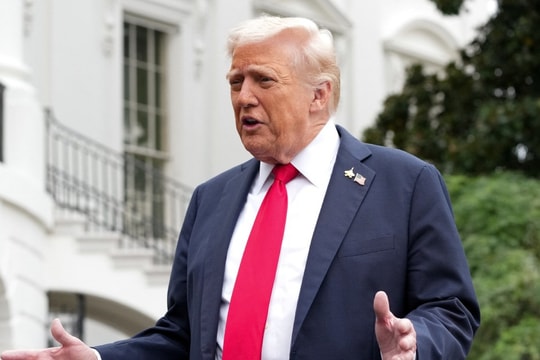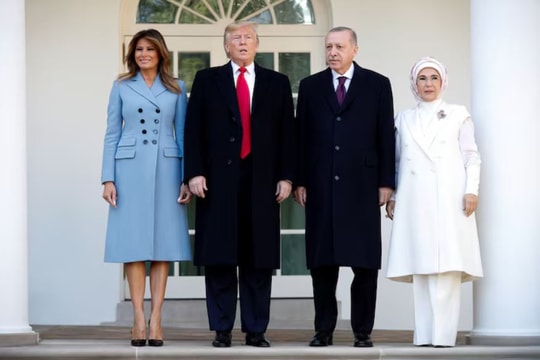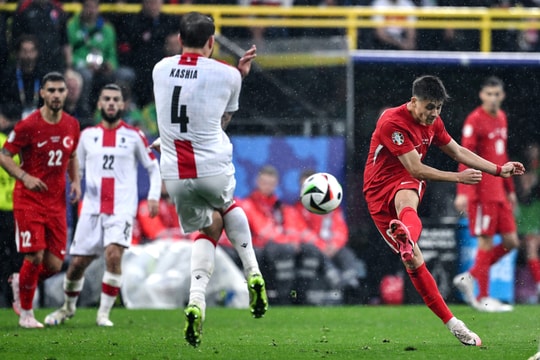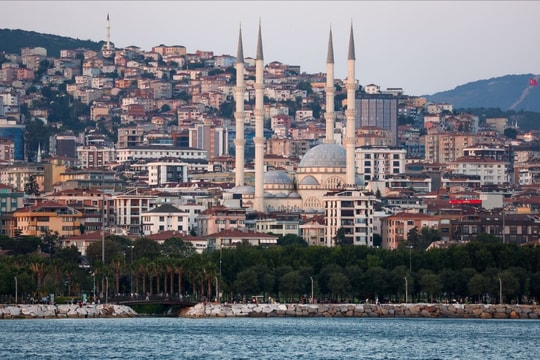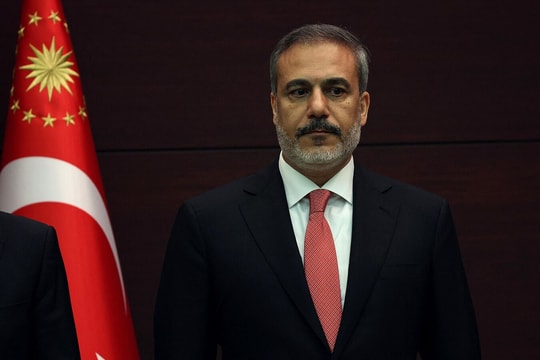US - Türkiye: Two allies full of suspicion
(Baonghean) - The US-Türkiye alliance has just "fallen" to a new dangerous level when both sides suspended visa issuance to each other's citizens. This incident, along with recent disagreements, continues to expose irreconcilable conflicts between these two allies full of suspicion of each other.
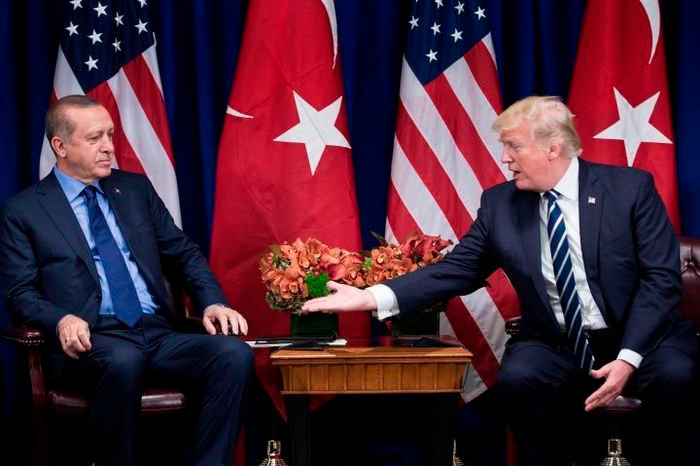 |
| US President Donald Trump met with his Turkish counterpart Tayip Erdogan in New York in September. Photo: Times |
Visa war
The fact that the US and Türkiye stopped issuing visas to each other's citizens almost simultaneously gave people the feeling that this was a "visa war".
On October 8, the US mission in Türkiye announced that it had suspended all non-immigrant visa services in Türkiye, citing the need to "reassess" Ankara's commitment to US diplomatic personnel.
The cause may be Türkiye's arrest last week of a US consulate employee in Istanbul over alleged links to a cleric believed to be behind last year's failed coup, a move Washington condemned as baseless and damaging to relations between the NATO allies.
“Recent events have forced the U.S. Government to reassess the Turkish Government’s commitment to the security of U.S. diplomatic missions and personnel,” the U.S. Embassy in Ankara said in a statement. “To minimize the number of visitors to the Embassy and consulates during this review, we have suspended all non-immigrant visa services at all U.S. diplomatic facilities in Turkey, effective immediately.”
Türkiye, then also retaliated with a similar decision.
Suspicious relationship
The US-Türkiye relationship, in name, still maintains the status of 'allies'. Specifically, the two sides are maintaining military cooperation activities within the framework of the North Atlantic Treaty Organization (NATO).
However, it would be wrong to say that this is the basis for bilateral trust. Both sides still have too much suspicion and conflict with each other on a series of issues.
The most fundamental obstacle to this relationship is Ankara's concerns about the US arming Kurdish armed forces in Syria - which Türkiye considers terrorists and inciting separatism in Türkiye.
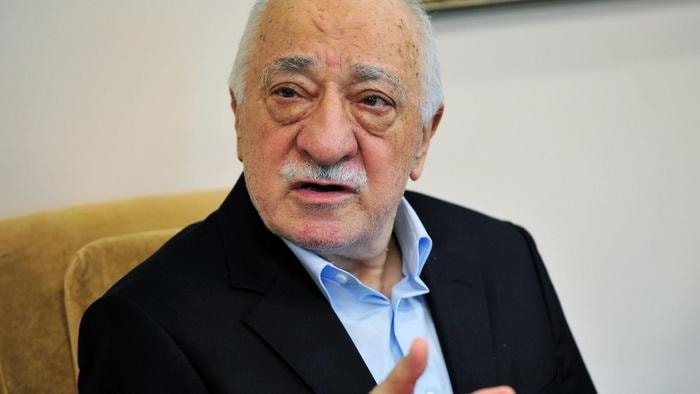 |
| The cleric Fethullah Gulen, who is living in exile in the US, is a thorn in the side of the current Ankara government (Turkey Telegraph) |
Washington has also been less positive about the extradition request for cleric Fethullah Gulen - who is believed to be behind last year's failed coup in Türkiye.
President Donald Trump's only general pledge that the US will "keep a close eye" on cleric Gulen could be seen as the biggest disappointment for Türkiye.
President Recep Tayip Erdogan visited the US in May and left without making any significant progress on either issue, leaving the relationship colder than ever. And it would not be surprising if Ankara took steps of its own.
The US also has many grievances with Türkiye. President Erdogan is said to have never been fully committed to the fight against radical Islamist groups in Syria.
Ankara is accused of providing financial support, weapons and explosives to many Syrian rebel forces, including IS militants, as well as allowing fighters and weapons to cross its border into Syria.
Türkiye is also seen as the 'outlet' for large amounts of oil that IS exploits from Syria and Iraq. The climax of the conflict was Türkiye's first deployment of troops to Syria under the pretext of strengthening border security and fighting terrorism in August 2016.
The US criticized this action, considering it an act of using the destruction of IS in Syria to wipe out Kurdish forces there.
Can't let go of Turkey?
In this power game, both Türkiye and the US are playing each other’s cards. With its geostrategic position between the two continents of Europe and Asia, Türkiye understands what it has and what the West expects from it.
It is the only Muslim country that is a member of NATO. Its relatively close relations with the West are an advantage that Türkiye can exploit.
Considered a buffer zone between Europe and the volatile Middle East, Türkiye is home to NATO's strategic Incirlik air base, which plays a key role in the coalition's fight against terrorism.
The US understands that Türkiye is an indispensable factor in the fight against IS, as well as using the Ankara government as a counterweight to Iran in the Middle East. But the current administration of President Tayip Erdogan has caused much discomfort in the West.
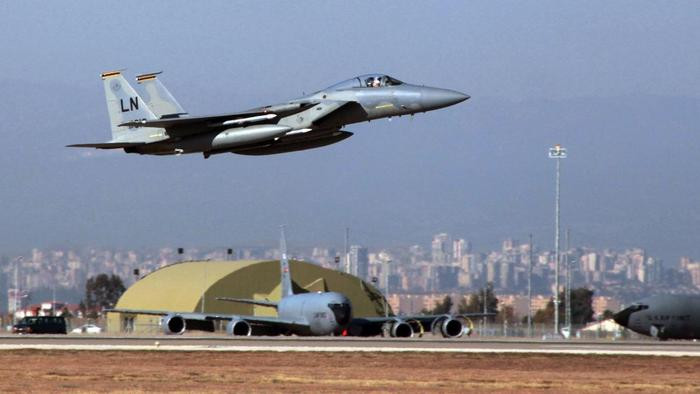 |
| A US Air Force F-15 fighter jet takes off from Incirlik Air Base in Andana, Türkiye. Photo: Los Angeles Times |
The US and its EU allies remain opposed to the "purge campaign" that the Turkish president has launched following the coup.
On the contrary, the Turkish government considers the EU and the US to use double standards when judging the country's internal affairs.
Long-standing disputes with the US on a series of issues have prompted Ankara to rush to mend ties with Russia, while adjusting its confrontational tendencies to dialogue with a series of regional governments such as Syria, Iran and Israel.
Most recently, Türkiye has made a move that has 'displeased' its Western allies. That is, it announced that it has made a deposit with Russia to buy the S-400 Triumf air defense missile system.
A very unpleasant scenario for NATO would be if a member were to use an adversary's air defense system with the ability to overwhelm the defense equipment of this military organization.
The alliance-as-rivalry relationship between the US, the West and Türkiye is still on the verge of exploding…
Thanh Son
| RELATED NEWS |
|---|

